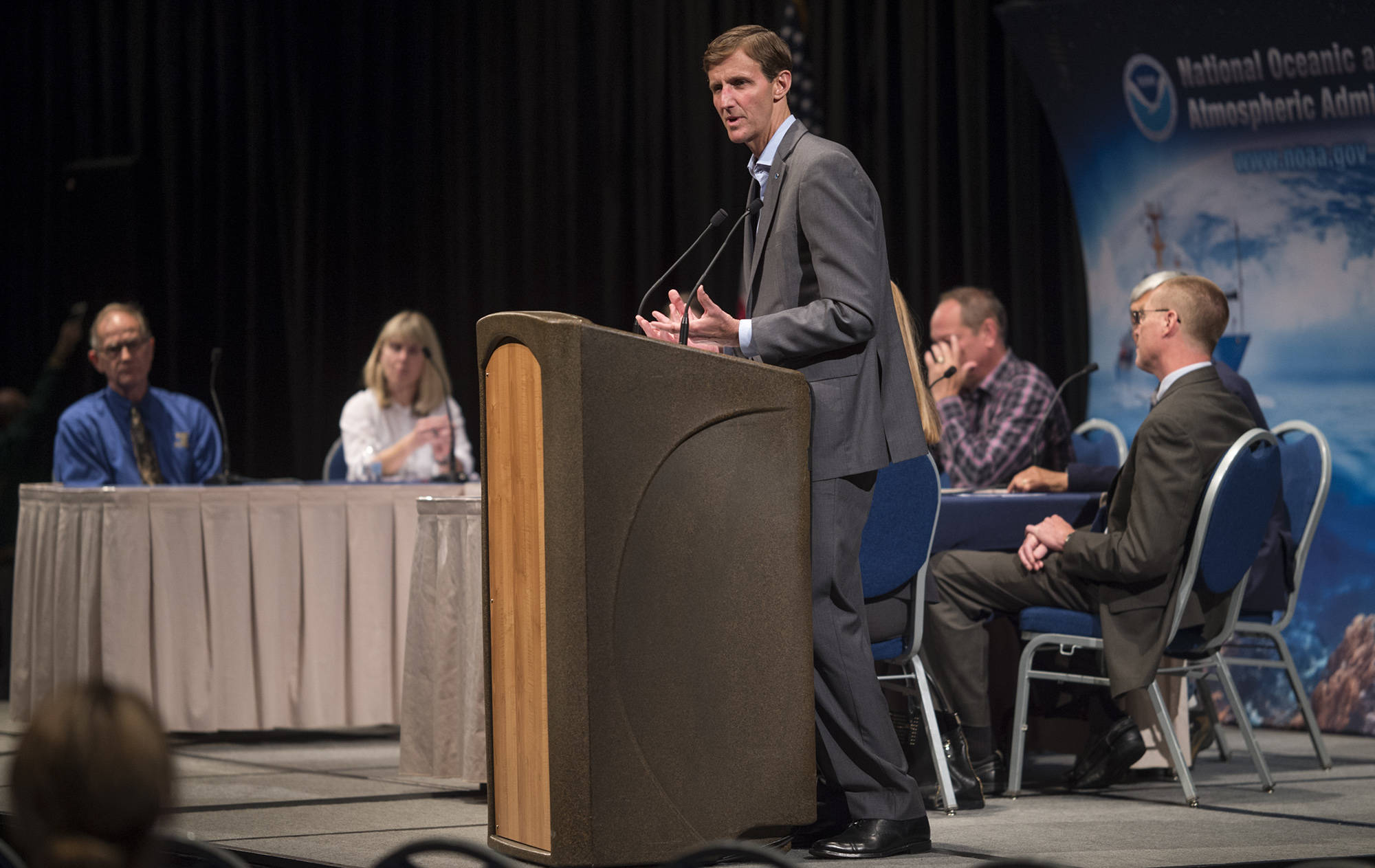In a Centennial Hall listening session, Alaskans raised concerns about federal plans to boost open-ocean fish farms under a new strategic plan for the U.S. Department of Commerce.
On Friday afternoon, Tim Gallaudet, acting undersecretary of commerce for oceans and atmosphere, hosted a listening session at the end of a weeklong gathering of National Oceanic and Atmospheric Administration experts in Juneau.
NOAA is an agency of the Department of Commerce, and Gallaudet is among the figures hosting meetings across the country as part of the process that creates the strategic plan.
In a speech opening the listening session, Gallaudet said the strategic plan is an “initiative to grow the American ‘blue economy.’”
That phrase is used as an umbrella term that includes fisheries, oceanic tourism and other aspects of the national economy that relate to the oceans.
Gallaudet echoed the familiar refrains of the Trump Administration, saying the department is interested in deregulation and “reducing the seafood trade deficit.”
President Donald Trump’s trade war with China has resulted in Chinese tariffs on Alaska seafood exported to that country, and American tariffs on processed Alaska seafood products imported from China.
“There’s some growing pains, but it’s about a free, fair and reciprocal trade policy,” Gallaudet said.
Several invited panelists gently prodded Gallaudet, and by extension the Trump Administration, to stabilize trade issues.
Among members of the public who offered their opinions, the issue of aquaculture was paramount. One of the goals within the strategic plan is “increase aquaculture production.”
”We will help it grow faster by reducing regulatory burden and driving aquaculture research,” the plan states.
“A strong U.S. marine aquaculture industry will serve a key role in U.S. food security and improve our trade balance with other nations.”
Alaska bans fish farms, but its jurisdiction extends only to waters 3 miles offshore. Beyond that limit is federal waters, and the state ban does not apply.
“We are very concerned about the aquaculture activities,” said Frances Leach, director of the United Fishermen of Alaska and a member of the invited panel Friday.
She went on to ask Gallaudet that any National Marine Fisheries Service guidelines in that area allow an opt-out clause.
Chris Oliver, assistant administrator for NOAA Fisheries and former director of the North Pacific Fishery Management Council, said concerns about aquaculture are somewhat misplaced.
“In terms of finfish, I think we’re talking about very contained operations, as opposed to hatchery operations,” he said.
That didn’t assuage the audience, which repeatedly expressed concerns about the idea that NOAA could allow deep-sea fish farms off Alaska’s coast.
“We already see kind of the questionable outcomes fish hatcheries have had,” said Kristine Trott, a member of the Alaska Department of Fish and Game’s Juneau-Douglas advisory committee.
Don Habeger, a candidate for the City and Borough of Juneau Assembly, asked Gallaudet if he would commit to shifting Alaska Fisheries Science Center staff from Washington state to Alaska, a long-held dream of Juneau residents.
“I cannot commit to a specified increase in employment anywhere,” Gallaudet replied.
Other speakers urged Gallaudet to take action that will help Alaska fisheries deal with the impacts of climate change and ocean acidification.
“I would encourage you to invest in science,” said Michael LeVine, senior Arctic fellow for the Ocean Conservancy.
• Contact reporter James Brooks at jbrooks@juneauempire.com or 523-2258.

